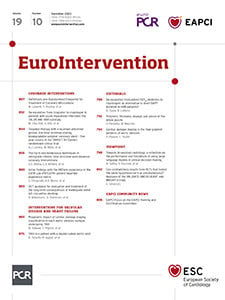An interview with the Chair, Radoslaw Parma

What is the role of the Committee?
Along with my Co-Chair, Dr Fabio Mangiacapra, and our committee members, we support the training of interventional cardiologists by developing proficiency standards in transcatheter coronary and structural heart disease interventions. Our team coordinates EAPCI Certification, aiming to establish universal recognition of training and competence. Furthermore, we analyse the disparities in interventional cardiology (IC) training programs in ESC countries. We aim to unify IC operator guidance across EAPCI member countries to ensure premier education, equal patient care, and foster international cooperation.
How does the EAPCI PCI Certification benefit the interventional cardiologist?
The EAPCI PCI Certification pathway helps IC operators obtain universal recommendations on knowledge, skills, and competency levels in interventional cardiology. The theory exam, based on 100 multiple-choice questions, can be taken online, while the practical pathway may be accomplished in local centres. EAPCI provides international recognition of the operator status. We are also focused on extending the number of countries that adopt the EAPCI exam and acknowledge EAPCI Certification.
Who should consider sitting the EAPCI PCI examination?
The exam will benefit three groups of interventional cardiologists and interventional cardiologists in training:
1. In countries without established IC certification programs, the exam provides an international certificate proving IC operator status.
2. In countries with ongoing IC certification programs, the exam allows an extension of the IC operator certification to other EAPCI member countries who agree to recognise it.
3. IC operators considering moving to an EAPCI member country may consider IC operator certification to confirm their experience in this field.
When does the EAPCI PCI examination take place, and how should one prepare for the EAPCI PCI examination?
The online EAPCI PCI Certification exam takes place yearly, in December. This year’s exam date is 15 December.
The best sources to prepare for the exam are as follows:
1. The PCR-EAPCI Textbook of Percutaneous Interventional Cardiovascular Medicine
2. Latest ESC Clinical Practice Guidelines
3. EAPCI Consensus and Position Papers on Interventional Cardiology
4. EAPCI PCI Core Curriculum
5. EAPCI Webinars
6. EAPCI Fellows Courses
What about structural intervention: are there plans for certification?
Training in structural heart disease interventions should be based on a core curriculum which defines competency levels and practical pathways for operators. A document has already been written and is pending publication. We plan to introduce preparatory courses, explain certification rules and run the EAPCI SHD exam in 2024.
How can EAPCI members become involved in the work of the EAPCI Training and Certification Committee?
We are waiting for your feedback on the barriers and solutions for IC operators training in your countries. We look forward to engaging with national working groups to develop joint training standards and offer the EAPCI Certification for international IC status recognition. We are open to cooperating with you on webinars and local courses that help IC achieve knowledge and skills in preparation for EAPCI Certification.
News
- Register here for the EAPCI PCI Examination https://www.escardio.org/Education/Career-Development/Certification/eapci-certification-exam

